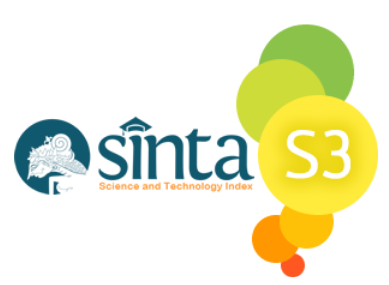USING MANIPULATIVES IN ETH-COOPERATIVE LEARNING TO ENHACE MATHEMATICAL LEARNING OUTCOMES
Abstract
This study aims to obtain an overview of the improvement in student mathematics learning outcomes using manipulatives with Cooperative Learning Everyone is a Teacher Here (ETH- cooperative learning) and students who learn to use manipulatives with conventional learning. The research design used was quasi-experiment with the type of pretest posttest control group design with a population of all first-level students who were studying matriculation at one of the STIKES in Indonesia. The number of samples of two classes was selected by purposive sampling, with the number of control class students being 38 people and the experimental class being 44 people. Class A as a control class gets conventional learning using manipulatives. Class B as an experimental class receives learning by using manipulatives through ETH-cooperative learning. The result is an increase in mathematics learning outcomes of students who learn to use manipulatives with ETH-cooperative learning higher than students who learn to use conventional manipulatives.
Keywords
Full Text:
PDFReferences
Clements, D. H. (1999). ‘Concrete’ Manipulatives, Concrete Ideas. Contemporary Issues in Early Childhood, 1(1), 45-60.
Johnson, D. W., and Johnson, R. T. (1999). Making Cooperative Learning Work. Theory into Practice, 38(2), 67-73.
Lestari, I. (2015). Pengaruh Waktu Belajar dan Minat Belajar Terhadap Hasil Belajar Matematika. Jurnal Formatif, 3(2), 115-125.
McGee, D., Jr., Moore-Russo, D., Ebersole, D., Lomen, D.O., and Quintero, M.M. (2012).Visualizing Three-Dimensional Calculus Concepts: The Study of a Manipulative’sEffectiveness. PRIMUS, 22(4), 265–283.
Meltzer, D. E. (2002). Addendum to: The relationship between mathematics preparation and conceptual learning gains in physics: a possible "hidden variable" in diagnostic pretest score. Retrieved from http://www.physics.iastate.edu/per/docs/Addendum_on_normalized_gain.
Millis, B. J. (2010). Cooperative Learning in Higher Education. Centers for Teaching and Technology - Book Library. 87.
Rivan, Y., M. & Masnarivan, Y. (2017). Penerapan Pembelajaran Ropes dan Pengetahuan Awal Terhadap Hasil Belajar Perkuliahan Matematika di STIKES Prima Nusantara. Jurnal Eksakta Pendidikan, 1(2).
Sappa, A. M. (2015). Hubungan Tipe Belajar Dengan Prestasi Belajar Mahasiswa Program Studi Si Keperawatan Semester VI Stikes Tana Toraja. Jurnal AgroSainT, VI(3).
Schweyer, S.R. 2000). The Effective Use of Manipulatives. (as seen in CORE PLUS). EDC 564 – Core Plus Math 1. Retrieved on August 31, 2017, from: http://gphillymath.org/ExempPaper/Documents/manipulatives.pdf
Slavin, R. E. (1980). Cooperative Learning. Review of Educational Research, 50(2), 315-342.
Springer, L., Stanne, M. E., and Donova, S. S. (1999). Effects of Small-Group Learning on Undergraduates in Science, Mathematics, Engineering, and Technology: A Meta-Analysis. Review of Educational Research, 69(1), 21.
Sudihartinih, E. (2012). Meningkatkan Kemampuan Penalaran Matematik Siswa SMA Melalui Pembelajaran Menggunakan Tugas Bentuk Superitem. Proeeding. Seminar Nasional Matematika VI di Universitas Negeri Semarang. Retreved from https://www.researchgate.net/publication/324200896_MENINGKATKAN_KEMAMPUAN_PENALARAN_MATEMATIK_SISWA_SMA_MELALUI_PEMBELAJARAN_MENGGUNAKAN_TUGAS_BENTUK_SUPERITEM.
Sudihartinih, E. (2014). Bilangan Bulat. Makalah yang disampaikan pada Kegiatan Pengabdian pada Masyarakat. Retrieved from https://www.researchgate.net/publication/326835697_Operasi_Hitung_Pada_Bilangan_Bulat.
Sudihartinih, E. & Purniati, T. (2017). Meningkatkan Kemampuan Pemahaman Matematis Mahasiswa dalam Perkuliahan Geometri Analitik pada Konsep Irisan Kerucut dengan Menggunakan Manipulatives. Proceeding. Seminar Nasional Matematika di UNPAR Bandung.
Sudjana, N. (1991). Penelitian Hasil Proses Belajar Mengajar. Bandung: Remaja Rosdakarya.
DOI: https://doi.org/10.18551/erudio.7-1.5
Refbacks
- There are currently no refbacks.
Copyright (c) 2020 Erudio Journal of Educational Innovation

This work is licensed under a Creative Commons Attribution 4.0 International License.












